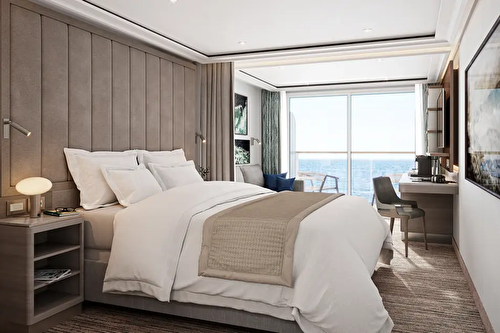Western Mediterranean from Monaco
- 7 Sep ‘25
- 8 nights
- Departing from Monte Carlo
- Silver Ray
-
Inside price fromCall for price
-
Outside price fromCall for price
-
Balcony price fromCall for price
-
Suite price from$12,700*/pp
YOUR ITINERARY
Monte Carlo, Monaco - Toulon, France - Palamos - Palma De Mallorca, Spain - Genoa, Italy - Livorno (Tuscany) - Porto Santo Steffano - Civitavecchia
The independent principality of Monaco is famous as the playgr...
The independent principality of Monaco is famous as the playground of the Côte d’Azur. With sandy beaches, elegant hotels and a vibrant nightlife, this tiny domain is a favourite haunt of the jet set. In the possession of the Grimaldi family for more then 700 years, treaties with France guarantee Monaco’s independence.
The population of the fashionable enclave is 32,000 citizens, for an area smaller than New York’s Central Park, but it boasts some of the most expensive real estate in the world. In addition to its luxury hotels and beautiful beaches, Monaco is noted for its mild climate and magnificent scenery. Once an exclusive wintering stop for Europe’s aristocracy and royalty, today there are more than 5 million visitors annually. Of the principality’s four sections – La Condamine, Fontvieille, Monaco-Ville and Monte Carlo, the latter two rank highest on every visitor’s must-see list.
In Monte Carlo, the Grand Casino and Opera is perhaps Monaco’s most outstanding attraction. For more than a century, the principality’s livelihood was centred beneath the copper roof of this splendid establishment. The resemblance to the Paris Opera House is less than accidental since they share the same architect, Charles Garnier. Also facing the square are the famed Hotel de Paris and the more modest Café de Paris. Monte Carlo spells sophistication; it is the epitome of elegance and glamour. Year after year, the rich and famous of business and entertainment gather here to bask in the sun, gamble at the world’s most opulent casino and attend spectacular parties. Nothing typifies more the elegant lifestyle of the Côte d’Azur than glamorous Monte Carlo.
Situated on a rocky peninsula, Monaco-Ville comprises the old town and the seat of Monaco’s government. Narrow streets lead to the Prince’s Palace high above the sea. The 19th-century Romanesque cathedral contains impressive works of art and the tombs of Princess Grace and Prince Rainer III, while the Parliament building and the Oceanographic Museum offer additional points of interest.
As if Monaco’s splendid attributes weren’t enough, the surrounding areas with their incredibly beautiful scenery are additional attractions.
Built around a sheltered bay, with 1,700-foot Mount F...
Built around a sheltered bay, with 1,700-foot Mount Faron as an impressive backdrop, Toulon is an important naval port and a city of industry and manufacturing. Its large harbor serves as the base for the French navy’s Mediterranean fleet and as the home to a sizeable marina, with yachts and pleasure boats adding bright splashes of color.
Toulon was the site where Napoleon Bonaparte first made a name for himself in 1793 during a siege in which the English, who had taken over Toulon, were expelled.
During World War II, the bulk of the French fleet anchored off Toulon was scuttled by French crews to prevent its acquisition by occupying German forces. The city was liberated in 1944 by French troops.
A maze of pedestrian streets constitutes the heart of old Toulon. Shops and colorful stalls make it an attractive area to explore. Avenue de la République runs parallel to the waterfront. At the western edge of the quay is the Naval Museum featuring an excellent collection of old and new ship models, figureheads, paintings and other items related to Toulon’s maritime history.
The town’s attractions can be seen in a fairly short time. Most visitors come here to explore the hinterland and other parts of the Riviera.
The Balearics are comprised of 16 islands; the thr...
The Balearics are comprised of 16 islands; the three principal ones are Mallorca, Ibiza and Minorca. Carthaginians, Romans, Vandals and Arabs have invaded these islands over the centuries. Ruins show evidence of the prehistoric Talayot civilization, a megalithic culture that flourished here between 1500 BC and the Roman conquest. Today the islands are besieged by invaders of a different sort – hordes of tourists.
Lying 60 miles (97 km) off the Spanish mainland, the islands’ lush and rugged landscape combined with an extremely mild, sunny climate proves irresistible, especially to northern Europeans. As a result, the Balearics boast cosmopolitan resorts with lively nightlife and plenty of sports activities.
Mallorca (also spelled Majorca) is the largest of the islands, with an area of more than 1,400 square miles (3626 sq.km). The scenery is magnificent, with cliffs along indented shorelines jutting out of the sea and mountain ranges sheltering the plains from harsh sea breezes. The fertile plain in the centre is covered with almond and fig trees plus olive groves with some trees more than 1,000 years old. Tall pines, junipers and oaks line the mountain slopes.
Palma de Mallorca is the capital of the archipelago. A cosmopolitan city with sophisticated shops and restaurants, it also offers buildings of spectacular Moorish and Gothic architecture.
In the western part of Mallorca, nestled into the mountains, lies the village of Valldemosa. It is known for its Carthusian Monastery where Frédéric Chopin and George Sand spent the winter of 1838-39.
Genoa’s location is wedged between a mountain ...
Genoa’s location is wedged between a mountain ridge and the seashore like an amphitheater. Medieval churches, 16th-century palaces, modern commercial streets and an enormous port justify the city’s nickname of La Superba (The Proud). Famous Genovese include Christopher Columbus, the navy admiral Andrea Doria and Nicolo Paganini, composer and violin virtuoso. The old port area has recently been renovated and features now Italy’s largest aquarium, the luxury hotel Jolly Marina and a variety of shops.
There are few more elegant places to salute the sunset t...
There are few more elegant places to salute the sunset than Terrazza Mascagni, Livorno’s refined chessboard piazza. A historic port, and a beachy gateway to Tuscany, Livorno welcomes you ashore to explore this enchanted Italian region’s sun-soaked beauty, rich flavours and world-renowned fine art. Stay in Livorno to explore ‘Piccolo Venezia’, or ‘Little Venice’ – a quarter of the town that’s laced with canals, little marble bridges and plenty of tempting eateries. View less
With its bustling market, fortresses and iconic waterfront, there’s plenty to keep you busy here, but most will be tempted to venture inland to explore more of Tuscany’s many charms and artistic wonders. Test your nose, as you breathe in the subtleties of Tuscany’s vineyard-draped scenery, and visit wineries showcasing the best of the renowned flavours of the Bolgheri wine-growing area. Or head out to Prato, where you’ll find tightly-woven textile history. Pisa’s showpiece tower is within reach, as is Florence’s city of immense and imaginative renaissance beauty. Admire the delicate carving of Michelangelo’s masterpiece, the David statue, and note the provocative stance as he casts a dismissive glance towards Rome. Stand before the city’s majestic black and white cathedral – the Cathedral of Santa Maria del Fiore – with its colossal brick dome. The view down over Florence’s river and grand dome from Piazzale Michelangelo, meanwhile, is one of Italy’s finest. However you choose to spend your time in Tuscany, you’ll discover an artistic region, filled with beauty designed to appeal to every sense.
A summer escape for Rome’s historic elite, the sta...
A summer escape for Rome’s historic elite, the stacked waterfront of Porto Santo Stefano is a secluded taste of idyllic southern Tuscany. Physically closer to Rome than Florence, the city is strung to Italy’s western coast by two sandy harnesses, and sits on the unqiue peninsula of Monte Argentario – which was once an island. Flamboyant pink flamingos and herons stroll through the encased lagoon, while Porto Santo Stefano’s waterfront hums with clinking cafes and strolling visitors. View less
The luxury yachts in the harbour show that Porto Santo Stefano has lost none of its luxury appeals, and with beaches, wild hikes and waterfront beauty, it continues to lure visitors to this secluded escape. Known for its fishing and cuisine – which is based around heavy use of the Tyrrhenian Sea’s juicy bounty. Stroll to Piazza dei Rioni for a dripping lemon gelato, or wander the streets noticing the lingering World War II damage – the city was heavily bombed during the conflict. Fortunately, the historic, star-shaped, Spanish fort was spared, and it still watches out resolutely over the waters. Built during the Napoleonic Wars, it fortified the exposed town against pirate raids, and offers beautiful views over the old town’s terracotta roofs. Rugged coastline falls to secluded beaches, with a wilder, unkempt charm. Sail the coves – seeing cascading olive groves – or island-hop to Giglio and Giannuti, which lie 12 miles from shore, and can be seen from the monastery topped Argentario mountain. On the other side of the promontory, you’ll find Porto Ercole – where the lifeless body of the Old Master, Caravaggio, was discovered.
All roads lead to Rome, and with good reason – this city ...
All roads lead to Rome, and with good reason – this city is one of the world’s most thrilling, offering unmatched history along every street. An evocative, inspiring and utterly artistic capital of unrivalled cultural impact, Rome is a city of back-to-back landmarks, which will take you on an exhilarating journey through the ages. This may be one of the world’s oldest cities, but it’s well and truly lived in. The ruins are punctuated with murmuring cafes, and the outdoor seating of restaurants sprawls out across piazzas, enticing you to sample tangles of creamy pasta and crispy pizzas. Rome’s incredible Roman Forum is littered with the ruins of its ancient administrations, which have stood firm for 2,000 years, since the times when the area was the centre of the Western world. Few sites are more simultaneously beautiful and haunting than that of the storied Colosseum, which looms deep into Rome’s rich blue sky. Take a tour to learn details of the grisly goings-on within. The best way to experience Rome is to wander its streets, gelato in hand. There is a lot to see here – whether it’s the domed spectacle of the Pantheon, or the elaborate flowing waters and artistry of the Trevi Fountain. Vatican City is an astonishing, colossal display of Catholic grandeur, while the Spanish Steps – crowned by the Trinità dei Monti church – offer a beautiful spot to gather and soak up the lively atmosphere of this humming city. With so much on the to-do list, you’ll relish the breaks you take, enjoying simple pleasures like a strong espresso, or fresh pasta with tomato sauce and ripped basil.
YOUR SHIP - The Silver Ray
Silversea’s second Nova Class ship arrived in summer 2024 and promises guests seamless destination connection. Silver Ray mirrors every aspect of her sister ship, Silver Nova, including a pioneering, asymmetrical design and extraordinary use of glass in both public areas and in suite for uninterrupted views wherever you are! What’s more, Silver Ray is one of the most spacious ships ever built, offering an exceptionally high space-to-guest ratio yet remaining nimble enough to offer purity in movement, as her name suggests. She is truly a ray of light.
Description
Silversea’s second Nova Class ship arrived in summer 2024 and promises guests seamless destination connection. Silver Ray mirrors every aspect of her sister ship, Silver Nova, including a pioneering, asymmetrical design and extraordinary use of glass in both public areas and in suite for uninterrupted views wherever you are! What’s more, Silver Ray is one of the most spacious ships ever built, offering an exceptionally high space-to-guest ratio yet remaining nimble enough to offer purity in movement, as her name suggests. She is truly a ray of light.
STATEROOMS


